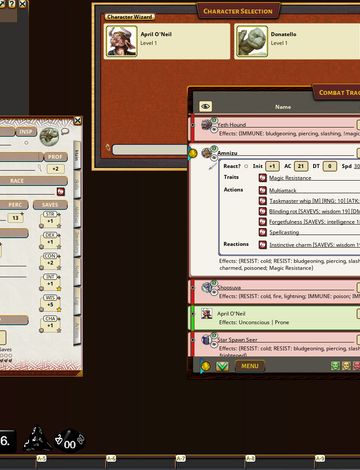Fantasy Grounds Unity aims to provide you with the ultimate virtual tabletop experience. Whether you’re delving into the dungeons of D&D or unraveling cosmic horror in Call of Cthulhu, this software promises a streamlined, immersive session with impressive support for various roleplaying games. But does it really live up to the hype?
Gameplay Mechanics
Fantasy Grounds Unity excels in providing a robust framework that’s easy to navigate right out of the box. The built-in support for multiple tabletop systems is a key strength. You can instantly dive into games like Dungeons and Dragons (2E, 3.5E, 4E, 5E), Pathfinder (1 and 2), and many more, thanks to preloaded content that minimizes prep time.
From an interface perspective, the Unity upgrade genuinely shines. The enhanced drawing tools and tile-based map-building functionalities are impressive, boasting features like dynamic Line of Sight and animated image effects. However, if you don’t commit time to fully explore these complex features, you might find the learning curve somewhat steep.
Graphics
The leap to a 64-bit Unity platform brings noticeable improvements to graphics quality and performance. Battlemaps are more detailed and vibrant, thanks to the comprehensive Asset Packs that come with the software. Whether it’s the Shockbolt GMW Kit or the multitude of art from the Torsten’s Asset Pack, the visual elements are nothing short of spectacular.
However, it’s worth mentioning that the high level of detail and the array of options can be overwhelming to new users. Veterans of virtual tabletops will likely appreciate these features more than novices.
Storyline and Characters
While Fantasy Grounds Unity isn’t a game with its own storyline and characters, its strength lies in providing you the tools to tell any story you want. This flexibility allows Dungeon Masters (DMs) and Game Masters (GMs) to run intricate campaigns with minimal fuss. Ready-made campaigns and data libraries for various systems are a colossal boon, cutting down on the time you’d spend inputting data.
Notable Strengths
- Robust Framework: Supports multiple tabletop systems, minimizing prep time.
- Enhanced Graphics: 64-bit Unity platform with detailed battlemaps and vibrant visuals.
- Dynamic Tools: Advanced drawing tools and tile-based map-building functionalities.
- Flexibility: Allows DMs and GMs to tell any story with minimal fuss.
- Comprehensive Asset Packs: A wealth of visual assets to enhance game sessions.
Notable Weaknesses
- Steep Learning Curve: Complex features can be overwhelming for new users.
- High Initial Setup: Requires significant time investment to fully utilize the platform.
Overall Impression
In the realm of virtual tabletops, Fantasy Grounds Unity stands out as a powerhouse of features and capabilities. Its transition to the Unity platform has brought richer graphics, better performance, and a suite of tools that can cater to both novice players and veteran GMs alike. That said, its complexity and steep learning curve may be off-putting for those new to virtual tabletops.
For dedicated gamers who are deeply entrenched in the world of tabletop RPGs, Fantasy Grounds Unity is an invaluable tool. However, casual players might find the initial setup and learning process cumbersome.
Rating: 3 out of 5 stars
Fantasy Grounds Unity is a solid choice for immersive and comprehensive virtual tabletop sessions, but it demands a level of commitment and exploration that might not appeal to everyone.
Recommended For: Seasoned Dungeon Masters and Game Masters looking to elevate their game sessions with detailed maps, streamlined mechanics, and a treasure trove of assets.
Gaming Tip for Beginners: Consider starting with simpler virtual tabletop solutions and gradually migrating to Fantasy Grounds Unity as your familiarity grows.
Want to check it out yourself? Click here to see it on Steam.
